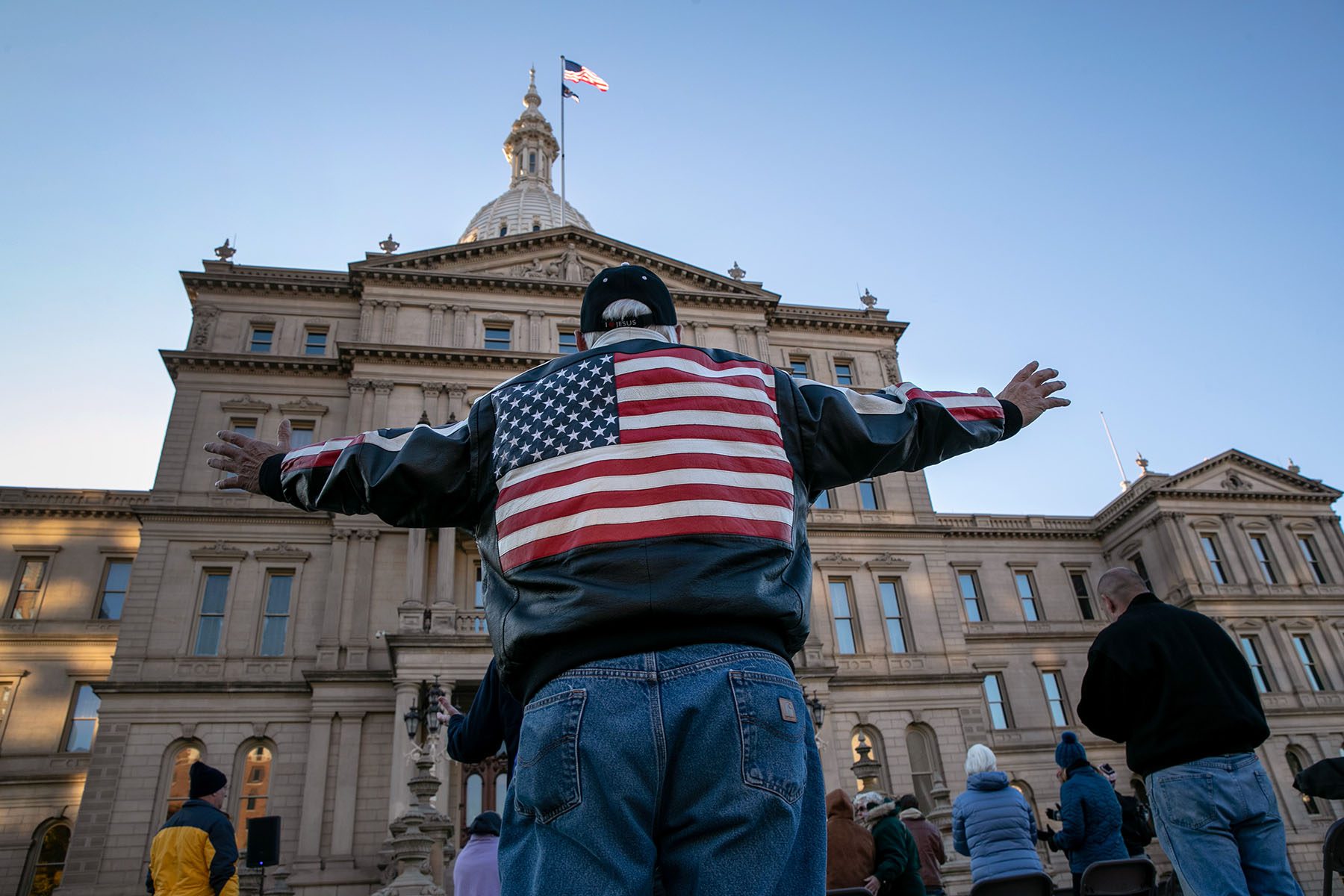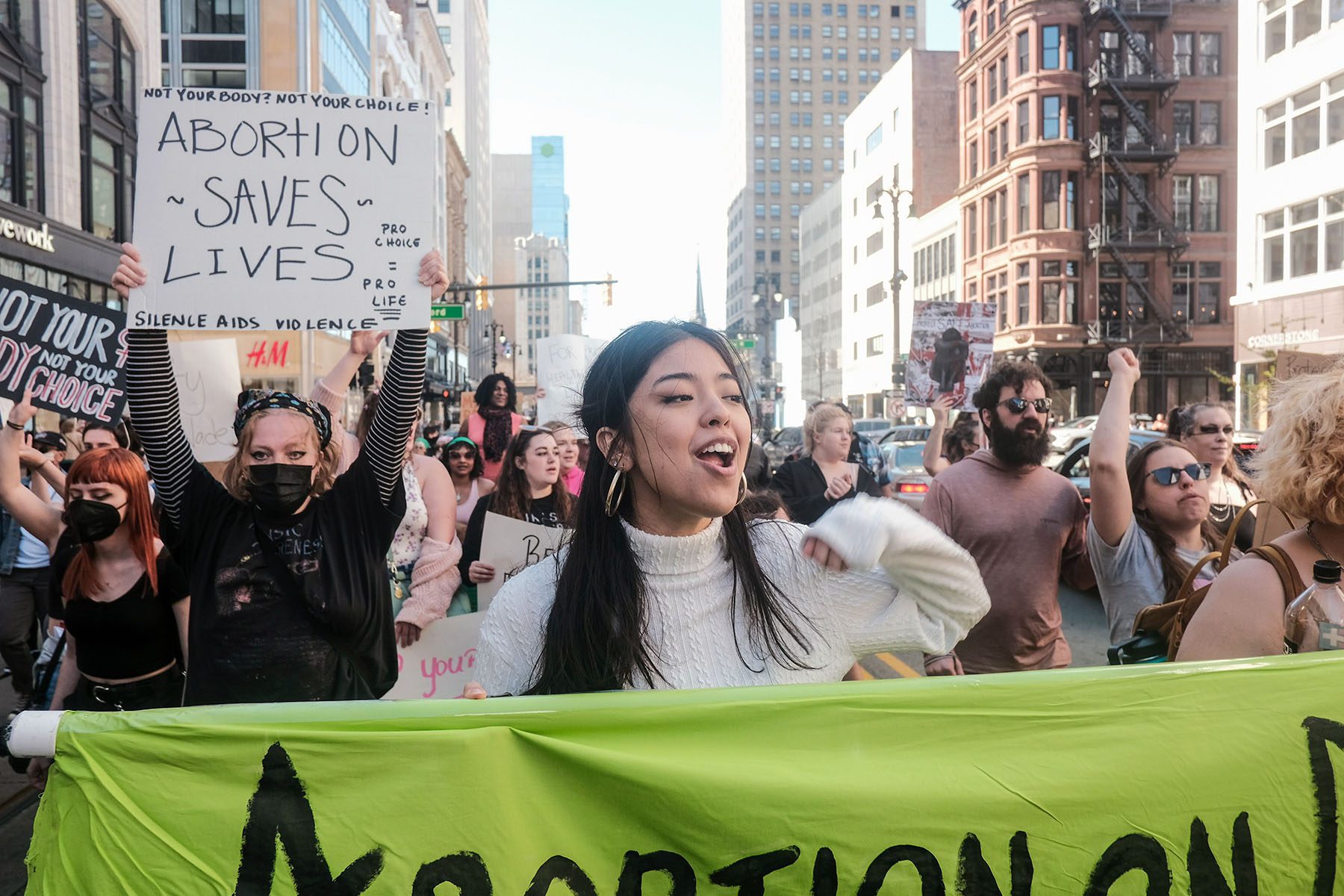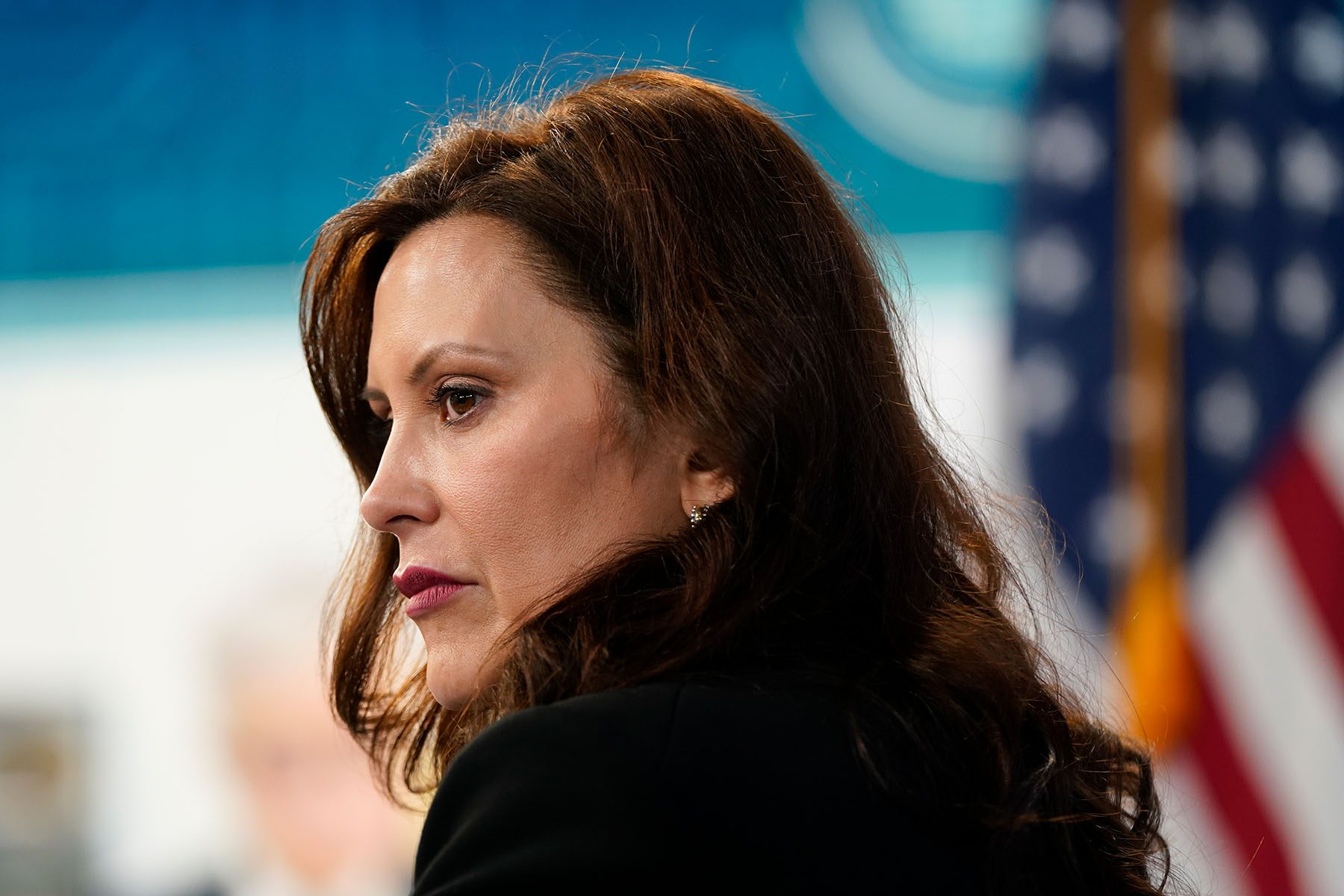GRAND RAPIDS, Michigan — One by one, the group around the table told stories about their relationship to abortion: One spoke candidly about getting the procedure following a life-threatening pregnancy. Another discussed her work as a pastor counseling people on abortion. At least two talked about difficult and traumatic pregnancies and births.
Michigan Gov. Gretchen Whitmer, also seated at the table, nodded as she listened. At one point, the discussion prompted the governor to say something that she’s repeated in some variation in recent weeks.
“The most profound economic decision a woman makes in her lifetime is when and whether to have a child,” she said. “And so to take that ability to decide — to make that decision — is going to have huge ramifications on all women, but particularly women on the lower end of the socio-economic spectrum.”
The Wednesday roundtable event came just two days before the Supreme Court overturned Roe v. Wade, the landmark ruling that had guaranteed the right to an abortion in America. The ruling returns the regulation of abortion back to states, and positions governors like Whitmer to be at the center of shaping policy for millions of people.
Whitmer is among a slew of Democratic governors who have been working to shore up abortion rights in their respective states. But as governors in states like California, New York and Illinois turn to Democratic majorities in the legislature to codify rules, Whitmer belongs to a smaller group of statewide executives who face political headwinds — and a reelection.
Republicans control both chambers of Michigan’s legislature. The state is also one of a handful with old abortion bans in the books that went dormant after the 1973 Roe ruling, creating current legal gray areas. On Friday, Whitmer released a statement that noted a 1931 Michigan law, which banned abortion without exceptions for rape or incest and included criminal penalties for providers, is on hold for now amid a lawsuit.
Whitmer said she is “more determined than ever to protect access to safe, legal abortion.”
“I will fight like hell to protect every Michigander’s right to make decisions about their own body with the advice of a medical professional they trust. I will not give in or give up for my kids, your kids, and the future of our great state,” she said.
Whitmer is competing in one of 36 governors’ races around the country this year. Democrats hold the governor’s office in several states with Republican-controlled statehouses. The Supreme Court’s decision on Friday is expected to add urgency to midterm election races for governor and legislatures that could ultimately determine the future of abortion access.
“State legislatures are where these laws, good and bad, are being written. The decision today puts the most basic access to reproductive health care on the ballot this November, state by state,” said Simone Leiro, a spokesperson for the States Project, an advocacy organization that is funding efforts to win majorities in state legislatures that protect abortion. “Defending statehouse majorities that will protect abortion access is our last line of defense and our best means to stop these attacks where they’re happening in state legislatures.”
Whitmer has implied that abortion will become a key campaign issue.
“I don’t think there’s a choice here. We have to talk about it,” she told The 19th in an earlier interview on June 16. “This is going to have a dramatic impact on the lives of millions of people in my own state and not much less across the country. Abortion care is health care.”
-
The Latest:
Whitmer, 50, had indicated that she would not wait on the federal government to take action on abortion. A few weeks ago she instructed her state agencies not to cooperate with authorities attempting to prosecute someone who obtains, provides or assists with an abortion. She is also publicly supporting a ballot initiative aimed at adding abortion protection language to the state constitution. Led by groups including the ACLU of Michigan and Planned Parenthood of Michigan, its supporters have until July to gather enough signatures to qualify the amendment on the November ballot. Anti-abortion groups have vowed to defeat the measure if it gets to voters.
But the most consequential action from Whitmer may be legal efforts. She filed a lawsuit in April that asked the Michigan Supreme Court to recognize abortion as a right under the state constitution and to effectively strike down the 1931 abortion ban. She asked the court to fast-track a decision, an unusual move that she has authority to make as governor. (Last month, a lower court suspended enforcement of the law through a separate lawsuit filed by Planned Parenthood of Michigan. The injunction, which is also being appealed, means the law is now technically in effect but not enforceable.)
On Friday, Whitmer filed a new motion urging the state Supreme Court to immediately consider her lawsuit.

“I’ve got unique tools here in Michigan that my counterparts don’t all have,” Whitmer told The 19th a few days before the Supreme Court’s ruling on Roe. “We also have a unique situation where we’re going to take one of the most dramatic swings in the nation. And so the combination of those two things I think has really propelled us to be more aggressive and more forward than perhaps some others.”
It’s also meant community outreach for Whitmer, who was elected in 2018 after several years serving in the Michigan statehouse. She said she’s holding a series of roundtables, including Wednesday’s event, around reproductive health. At her first roundtable a few weeks ago, Whitmer said she heard from a mother of three who made the decision to terminate a pregnancy because of the health needs of her children.
“Every time that there’s a conversation around someone’s lived experience it helps inform the work that we do to ensure we’re being more inclusive, we’re being more thoughtful in terms of finding empowered voices with unique perspectives so we broaden the conversation,” Whitmer said.
Whitmer was among the governors who gained national attention during the COVID-19 pandemic for challenging former President Donald Trump over his public health response. Early in the pandemic, Trump publicly criticized Whitmer and called her “the woman in Michigan.” Whitmer has been the subject of harassment and threats of violence as her profile has risen to the point of making the short list for vice presidential running mate for President Joe Biden during his 2020 bid.
Whitmer has advocated for abortion rights for years — work that has been personal at times.
“As a woman and as a sexual assault survivor, as the mother of two daughters, I have an inherent passion on this front,” Whitmer told The 19th.
Whitmer first spoke publicly about her sexual assault in 2013, when she was a state senator and was explaining her opposition to a Republican-led bill that would ban insurance coverage of abortion unless the pregnant person’s life is in danger. Whitmer said on the Senate floor that it was difficult to talk about being raped when she was a college student in the late 1980s.
-
Read More
- This anti-abortion group shapes laws nationwide. Your state may be next.
- Liberal justices’ dissent sketches out ‘the loss of power, control, and dignity’ in a post-Roe America
- From marriage equality to interracial marriage, Supreme Court conservatives appear divided on handling civil rights after Roe decision
“I think you need to see the face of the women that you are impacting by this vote today,” she told her colleagues back then. “I think you need to think of the girls that we are raising and what kind of a state we want to be where you would put your approval on something this extreme.”
Michigan Republicans have been discussing additional legislative actions in response to the Roe decision. Earlier this week, Republican Rep. Steve Carra introduced a bill that would enforce the 1931 abortion ban and update it. The bill proposes that a person who performs most abortions be guilty of a felony that would include up to 10 years of prison and fees of up to $100,000. Another provision would include a felony and prison time of up to 20 years for a person who manufactures, distributes or sells medications that induce abortions.
Carra said in a news release that he was responding in part to the legal ambiguity around the 1931 law.
“It is time to begin exploring other avenues to protect the sanctity of human life,” he said in a statement.
At Wednesday’s roundtable, the group vented about Michigan Republican lawmakers and the ramifications of more restrictions on abortion.
“This is a personal choice,” said an attendee who identified only as Taylor and who spoke about a complicated pregnancy and birth. “Abortion, reproductive care, is something that is emotional. It’s something that is going to invoke a response in almost everyone. But at the same time, it’s something that we should be able to decide for our own families, for our own lives.”
Alisha Meneely, another attendee who described herself as a “pro-choice Republican,” said while she disagrees with Whitmer on other policies, she has appreciated her approach to abortion. But Meneely was also realistic about what could happen next.

“There’s nothing that she’s going to be able to get done in regards to this subject through the legislature, it’s just going to be impossible,” she said. “She is going to have to rely on the Supreme Court ruling — ours — or getting this on the ballot.”
Meneely said Whitmer needs to hold more public events that feature women and others impacted by abortion. Some on the panel also said that they hadn’t yet signed the petition to get abortion rights on the ballot because they didn’t know about it.
“We definitely need to get some more groups out there that are having these conversations on a weekly basis and getting it in the media and talking about this a lot more loudly — just not behind closed doors,” Meneely said.
It’s unclear for now what Whitmer will be able to accomplish, but the governor seems to recognize that.
“We have pulled out all the stops. We’ve got three avenues to protect choice in Michigan. We are pursuing all of them,” she said. “We don’t know if any one of them will work. Maybe all three of them will be successful. We can’t make any assumptions though. And that’s why we’ve got to pursue each of these three avenues.”









